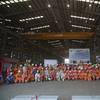U.S. Customs Commissioner Robert C. Bonner and Yong-Sup Lee, Commissioner of the Customs Service of the Republic of Korea, today announced that the government of the Republic of Korea has agreed to participate in the U.S. Customs Container Security Initiative (CSI). Commissioner Lee and Deputy U.S. Customs Commissioner Douglas M. Browning conducted the signing ceremony on Friday, January 17, in Seoul.
CSI is a U.S. Customs initiative designed to prevent the smuggling of terrorists or terrorist weapons in ocean-going cargo containers. Under terms of the declaration announced today, U.S. Customs officers will be stationed at the port of Busan.
"I am very pleased that the Republic of Korea has agreed to join with the United States in the Container Security Initiative," said Commissioner Bonner. "We recognize the high volume of trade between the Port of Busan and seaports in the U.S. and Busan's role as an intermodal transport hub for cargo originating in many countries. This is an important step, not only for the protection of trade between the U.S. And the Republic of Korea, but for the protection of the most critical component of the world trading system as a whole--containerized cargo."
Globally, over 48 million full cargo containers move between major seaports each year. Each year, more than 16 million containers arrive in the United States by ship, truck, and rail.
"We recognize the importance to deter and interdict any terrorist attempt to disrupt global trade or to attempt to make use of commercial shipping to further their own schemes, "said Yong-Sup, Lee, Commissioner of the Customs Service of the Republic of Korea.
The CSI initiative supports the "Cooperative G8 Action on Transport Security" adopted by G8 in June 2002.
Launched by U.S. Customs in January 2002, CSI consists of four core elements. These include: (1) using automated information to identify and target high-risk containers; (2) pre-screening those containers identified as high-risk before they arrive at U.S. ports; (3) using detection technology to quickly pre-screen high-risk containers; and (4) using smarter, tamper proof containers.
The initial objective is to implement CSI at the ports that send large volumes of cargo containers into the United States, in a way that will facilitate detection of potential security concerns at their earliest possible opportunity.
One element of CSI involves placing U.S. Customs inspectors at foreign seaports to target and prescreen U.S.-bound cargo containers before they are shipped to America.
"We are in the process of getting CSI implemented in those ports that have signed on. We have deployed and will continue to deploy teams to the participating ports as quickly as possible," Commissioner Bonner said. "We are looking to expand CSI beyond the top 20 ports, as rapidly as we can. Once we have implemented CSI at most of the top 20 ports, we will quickly expand CSI to all ports that ship substantial amounts of cargo to the United States, and that have the infrastructure and technology in place to participate in the program."













